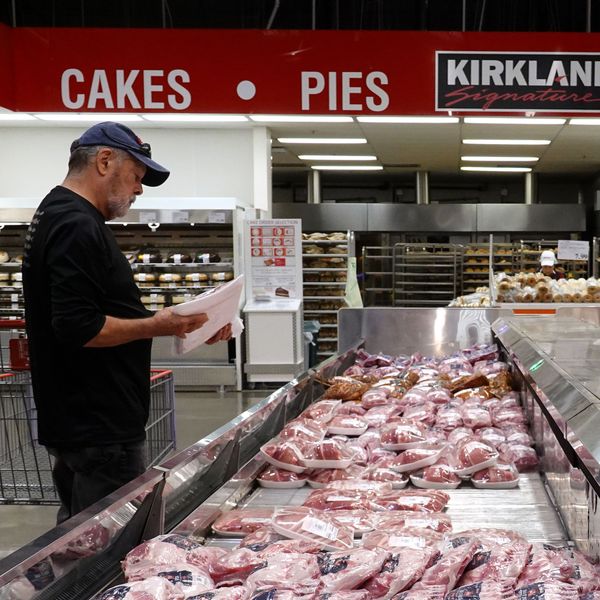
Sen. Cory Booker (D-N.J.) said, "the U.S. is losing farmers at an alarming rate, agricultural jobs and wages are drying up, and rural communities are disappearing." (Photo: Wisconsin Department of Natural Resources/flickr/cc)
New 'Groundbreaking' Bill Would Put Firm Pause on Out-of-Control Food Industry Mega-Mergers
"Consolidation has now reached a point where the top four firms in almost every sector of the food and agriculture economy have acquired abusive levels of market power," said Sen. Cory Booker, who introduced the legislation
Reviving an effort made nearly 20 years ago by Paul Wellstone, the late Democratic senator from Minnesota, U.S. Senator Cory Booker (D-N.J.) introduced legislation on Tuesday that would put a check on "the ever-increasing levels of corporate concentration" in the food system.
S.3404, "The Food and Agribusiness Merger Moratorium and Antitrust Review Act of 2018," is backed by organizations including ActionAid USA, Farm Aid, the Institute for Agriculture and Trade Policy, and the National Farmers Union, and would put an 18-month pause on large agribusiness, food and beverage manufacturing, and grocery retail mergers, and also establish a 12-member commission tasked with probing the causes and effects of such concentration and suggesting regulation to ensure fairness of competition in the market.
"Consolidation has now reached a point where the top four firms in almost every sector of the food and agriculture economy have acquired abusive levels of market power," Booker said in a press statement Wednesday. "As a result, the U.S. is losing farmers at an alarming rate, agricultural jobs and wages are drying up, and rural communities are disappearing."
Wenonah Hauter, executive director of Food & Water Watch, hailed the measure as "groundbreaking" and "a crucial step to busting up the 'Foodopoly' in which a handful of players drive food policy in the service of Wall Street, not Main Street."
The bill illustrates some of the factors that "are driving small family farmers out of business." As noted in the text:
- In the past three decades, the top 4 largest pork packers have seized control of 71 percent of the market, up from 36 percent. Over the same period, the top 4 beef packers have expanded their market share from 32 percent to 85 percent
- The top 4 grain companies today control 4 nearly 90 percent of the global grain trade.
- During the past 2 years there has been a wave of consolidation among global seed and crop-chemical firms, 3 companies now control nearly 2 / 3 of the world's commodity crop seeds. Those same 3 companies now also control nearly 70 percent of all agricultural chemicals and pesticides.
"This bill would put a much-needed pause on the largest, most consequential acquisitions and mergers in the food and agriculture sector, and give Congress an opportunity to update our antitrust laws in order to better protect America's farmers, workers, consumers, and rural communities who are being harmed by the ever-increasing levels of corporate concentration," Hauter added.
Helping to craft the bill was the Organization for Competitive Markets (OCM), a Lincoln, Nebraska-based think tank and advocacy group fighting corporate concentration in the food system.
"We need Congress to act now to stop mega-mergers until their full impact can be assessed and market safeguards put in place," stated Joe Maxwell, executive director of OCM.
"Farmers are being squeezed at both ends by corporations with abusive levels of power, from the sellers of inputs farmers need to the buyers of farmers' goods," he added. "There is simply no profit for the farmer who actually raises and grows the food. Today, farmers are forced to farm for government subsidies and not for the market."
An Urgent Message From Our Co-Founder
Dear Common Dreams reader, The U.S. is on a fast track to authoritarianism like nothing I've ever seen. Meanwhile, corporate news outlets are utterly capitulating to Trump, twisting their coverage to avoid drawing his ire while lining up to stuff cash in his pockets. That's why I believe that Common Dreams is doing the best and most consequential reporting that we've ever done. Our small but mighty team is a progressive reporting powerhouse, covering the news every day that the corporate media never will. Our mission has always been simple: To inform. To inspire. And to ignite change for the common good. Now here's the key piece that I want all our readers to understand: None of this would be possible without your financial support. That's not just some fundraising cliche. It's the absolute and literal truth. We don't accept corporate advertising and never will. We don't have a paywall because we don't think people should be blocked from critical news based on their ability to pay. Everything we do is funded by the donations of readers like you. Will you donate now to help power the nonprofit, independent reporting of Common Dreams? Thank you for being a vital member of our community. Together, we can keep independent journalism alive when it’s needed most. - Craig Brown, Co-founder |
Reviving an effort made nearly 20 years ago by Paul Wellstone, the late Democratic senator from Minnesota, U.S. Senator Cory Booker (D-N.J.) introduced legislation on Tuesday that would put a check on "the ever-increasing levels of corporate concentration" in the food system.
S.3404, "The Food and Agribusiness Merger Moratorium and Antitrust Review Act of 2018," is backed by organizations including ActionAid USA, Farm Aid, the Institute for Agriculture and Trade Policy, and the National Farmers Union, and would put an 18-month pause on large agribusiness, food and beverage manufacturing, and grocery retail mergers, and also establish a 12-member commission tasked with probing the causes and effects of such concentration and suggesting regulation to ensure fairness of competition in the market.
"Consolidation has now reached a point where the top four firms in almost every sector of the food and agriculture economy have acquired abusive levels of market power," Booker said in a press statement Wednesday. "As a result, the U.S. is losing farmers at an alarming rate, agricultural jobs and wages are drying up, and rural communities are disappearing."
Wenonah Hauter, executive director of Food & Water Watch, hailed the measure as "groundbreaking" and "a crucial step to busting up the 'Foodopoly' in which a handful of players drive food policy in the service of Wall Street, not Main Street."
The bill illustrates some of the factors that "are driving small family farmers out of business." As noted in the text:
- In the past three decades, the top 4 largest pork packers have seized control of 71 percent of the market, up from 36 percent. Over the same period, the top 4 beef packers have expanded their market share from 32 percent to 85 percent
- The top 4 grain companies today control 4 nearly 90 percent of the global grain trade.
- During the past 2 years there has been a wave of consolidation among global seed and crop-chemical firms, 3 companies now control nearly 2 / 3 of the world's commodity crop seeds. Those same 3 companies now also control nearly 70 percent of all agricultural chemicals and pesticides.
"This bill would put a much-needed pause on the largest, most consequential acquisitions and mergers in the food and agriculture sector, and give Congress an opportunity to update our antitrust laws in order to better protect America's farmers, workers, consumers, and rural communities who are being harmed by the ever-increasing levels of corporate concentration," Hauter added.
Helping to craft the bill was the Organization for Competitive Markets (OCM), a Lincoln, Nebraska-based think tank and advocacy group fighting corporate concentration in the food system.
"We need Congress to act now to stop mega-mergers until their full impact can be assessed and market safeguards put in place," stated Joe Maxwell, executive director of OCM.
"Farmers are being squeezed at both ends by corporations with abusive levels of power, from the sellers of inputs farmers need to the buyers of farmers' goods," he added. "There is simply no profit for the farmer who actually raises and grows the food. Today, farmers are forced to farm for government subsidies and not for the market."
Reviving an effort made nearly 20 years ago by Paul Wellstone, the late Democratic senator from Minnesota, U.S. Senator Cory Booker (D-N.J.) introduced legislation on Tuesday that would put a check on "the ever-increasing levels of corporate concentration" in the food system.
S.3404, "The Food and Agribusiness Merger Moratorium and Antitrust Review Act of 2018," is backed by organizations including ActionAid USA, Farm Aid, the Institute for Agriculture and Trade Policy, and the National Farmers Union, and would put an 18-month pause on large agribusiness, food and beverage manufacturing, and grocery retail mergers, and also establish a 12-member commission tasked with probing the causes and effects of such concentration and suggesting regulation to ensure fairness of competition in the market.
"Consolidation has now reached a point where the top four firms in almost every sector of the food and agriculture economy have acquired abusive levels of market power," Booker said in a press statement Wednesday. "As a result, the U.S. is losing farmers at an alarming rate, agricultural jobs and wages are drying up, and rural communities are disappearing."
Wenonah Hauter, executive director of Food & Water Watch, hailed the measure as "groundbreaking" and "a crucial step to busting up the 'Foodopoly' in which a handful of players drive food policy in the service of Wall Street, not Main Street."
The bill illustrates some of the factors that "are driving small family farmers out of business." As noted in the text:
- In the past three decades, the top 4 largest pork packers have seized control of 71 percent of the market, up from 36 percent. Over the same period, the top 4 beef packers have expanded their market share from 32 percent to 85 percent
- The top 4 grain companies today control 4 nearly 90 percent of the global grain trade.
- During the past 2 years there has been a wave of consolidation among global seed and crop-chemical firms, 3 companies now control nearly 2 / 3 of the world's commodity crop seeds. Those same 3 companies now also control nearly 70 percent of all agricultural chemicals and pesticides.
"This bill would put a much-needed pause on the largest, most consequential acquisitions and mergers in the food and agriculture sector, and give Congress an opportunity to update our antitrust laws in order to better protect America's farmers, workers, consumers, and rural communities who are being harmed by the ever-increasing levels of corporate concentration," Hauter added.
Helping to craft the bill was the Organization for Competitive Markets (OCM), a Lincoln, Nebraska-based think tank and advocacy group fighting corporate concentration in the food system.
"We need Congress to act now to stop mega-mergers until their full impact can be assessed and market safeguards put in place," stated Joe Maxwell, executive director of OCM.
"Farmers are being squeezed at both ends by corporations with abusive levels of power, from the sellers of inputs farmers need to the buyers of farmers' goods," he added. "There is simply no profit for the farmer who actually raises and grows the food. Today, farmers are forced to farm for government subsidies and not for the market."

